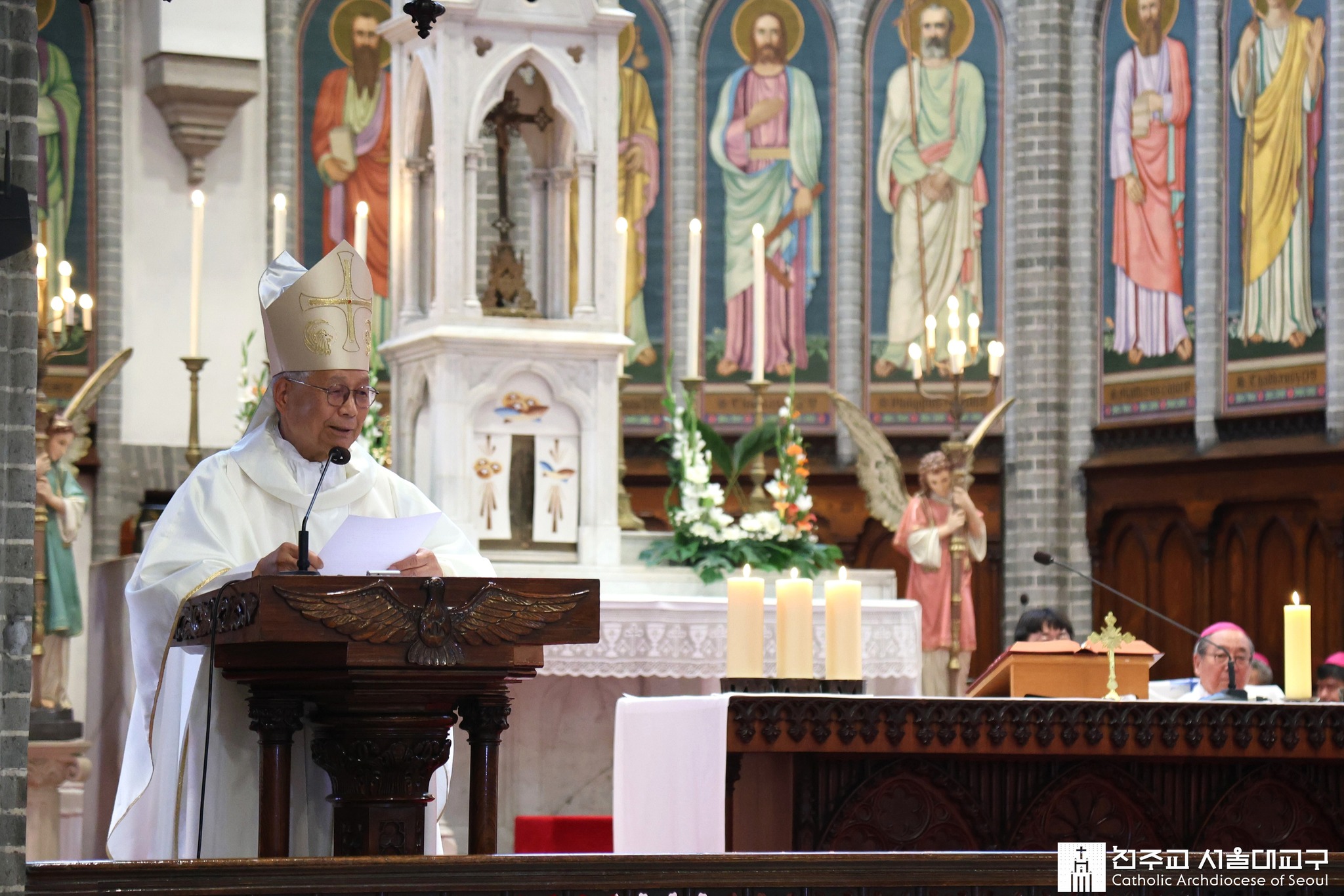
Pope Francis sent a brief message to the president of the Bishops' Conference of Korea, Bishop Mathias Ri Iong-hoon, to mark the 70th anniversary of the end of the war that split Korea into two.
“I believe that the commemoration of the Armistice will not only refer to the cessation of hostilities, but will also offer a bright future of reconciliation, brotherhood and lasting harmony for the Korean Peninsula and indeed for the wider world,” writes the pontiff.
Card Lazarus You Heung-sik, Prefect of the Congregation for the Clergy, read the papal message during a Mass for Peace celebrated today in the Cathedral of the Immaculate Conception in Myeongdong (Seoul), where prayers have been held every week for almost 30 years in favour of the reconciliation of the Korean people.
Pope Francis personally led a solemn Mass with this intention in 2014, during his trip to South Korea. In today’s message, he says: “I am spiritually close to you. May this anniversary be an occasion for the bishops, priests, religious and laity of your land to renew their commitment to building the Kingdom of Almighty God, which is full of ‘righteousness, peace and joy in the Holy Spirit” (Rom 14:17).
“Today's numerous wars and armed conflicts, which afflict the human family, especially our most vulnerable brothers and sisters, are a tragic reminder of the need for constant vigilance to defend and promote justice and friendly cooperation within communities and among peoples.
“In this sense, I would like to encourage all Koreans to be ‘prophets’ of peace.” Such a “Peace is always ‘based on respect for the individual ... It is based on respect for the law and the common good, respect for the environment entrusted to us, and respect for the rich moral traditions inherited from our ancestors’.”
In his address, Card You Heung-sik also said, “We hope that Pope Francis can realise his wish to visit North Korea.” He was not alone to speak.
In addition to the cardinal and the pope’s words, the Mass in Myeongdong cathedral echoed with the vibrant words of the homily delivered by Bishop Peter Lee Ki-heon of Uijeongbu. Born in Pyongyang, he chairs the Korean Church's National Reconciliation Commission.
“I was born in Pyongyang in 1947, before the war broke out. My family lived in Pyongyang and suffered from the North Korean communist regime's subtle policy of genocide,” the prelate said.
“When the clergy of the Pyongyang diocese were arrested and unable to practise their faith, they fled to the south in search of freedom of religion. During the evacuation process, my two sisters were unable to come together and became separated.”
“Because of this family background, choosing the Pyongyang diocese when I entered the seminary and then became a priest, serving on the National Reconciliation Committee was my calling.”
“When I entered the seminary, I thought that by the time I would become a priest, I would be able to go back and work in the Diocese of Pyongyang.” Now “I have been a groom for almost 50 years and I am about to retire,” and “my hopes for reunification are fading.
Bishop Lee noted that the armistice was signed 70 years ago “until a final peaceful settlement is reached”, but this never happened.
“In 2018, starting with the Pyeongchang Winter Olympics, [. . .] warm winds of peace [. . .] blew across the Korean Peninsula.” Political leaders from the North and the South shook hands and made speeches, but in the end, talks in Hanoi failed.
“In the history of the Korean peninsula, we experienced not just the conflict of interests or lack of dialogue between the North and the South, which stand in the way of peace on the Korean peninsula, but also the surrounding powers who want to use the Korean peninsula issue for their own interests.
Instead, “it is our people, not the United States or China, who should strive for peace on the Korean peninsula. To this end, the North and the South must work together.”
The Pyongyang native also expressly mentioned the profoundly changed climate following last year's election in South Korea.
In his words, “a cold and fierce wind is now blowing on the Korean peninsula. North Korea also continues its frantic missile launches. The harder the leaders of the North and the South become, the greater the confrontation for our people, who tremble with anxiety under the shadow of war.
“Today, we earnestly pray that the rulers of the North and the South will be leaders who will soothe the anxious hearts of the people, listen to the voice of the people, and wipe away their tears.”
In concluding, the prelate called on everyone to build peace starting with their own hearts, coming to terms with the "hostility" towards those on the other side that every Korean inhales from childhood.
On a final personal experience, about his “first visit to North Korea many years ago”, he said: “I went to the North Korean consulate in China to get a visa, and there was a North Korean flag and a portrait of Kim Il Sung. Seeing that, we became very nervous, and the diplomat who was issuing us visas said: ‘You're very worried. Don't worry. North Korea is also a place where people live.’"
“On the occasion of the 70th anniversary of the Armistice, let us pray for a new establishment of peace in this land”. To this end, “as the first step, let us strive to be Christians who live and preach ‘brotherhood’ in our churches first, shed ‘tears’ together in the pain of our neighbours, and smile gently to one another.”
